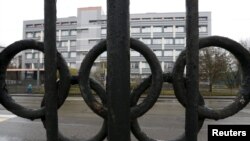Putin made his remarks on March 1 in Krasnoyarsk at a meeting focusing on preparations for the 2019 Winter Universiade, an international university-level sports competition scheduled to take place in the Siberian city in two years.
"I would like to speak about the cleanliness of sports, namely anti-doping programs... I want to say once again:there has never been and I hope there will never be any state system to support doping. On the contrary, there will only be the fight against doping," Putin said.
Putin has steadfastly denied the existence of a state-sponsored sports doping program, a message echoed by other Russian officials.
“Russia has never created [a doping program]. It is simply impossible and we will do everything to prove that this never happened, the state doping system or support of performance-enhancing drugs,” Putin said at his annual year-end press conference in December 2016.
Russian officials began to circle the wagons after the McLaren report (part one) (part two) found widespread, state-sanctioned doping in Russian sport.
The report by independent Canadian expert Richard McLaren led to Russia's track-and-field athletes being banned from the 2016 Olympic Games in Rio de Janerio.
The entire Russian team was also banned from taking part in the Paralympic Games.
And Russian athletes still remain banned from international competition.
Russia's wall of denial did appear to crack at the end of 2016.
Russia’s anti-doping chief admitted to systematic doping of athletes in an interview with The New York Times.
“It was an institutional conspiracy,” Anna Antseliovich, the acting director general of Russia’s national antidoping agency, RUSADA, told the U.S. daily in the report published on December 27.
The New York Times report summarized the scope of the doping scheme:
A lab director tampered with urine samples at the Olympics and provided cocktails of performance-enhancing drugs, corrupting some of the world’s most prestigious competitions. Members of the Federal Security Service, a successor to the K.G.B., broke into sample bottles holding urine. And a deputy sports minister for years ordered cover-ups of top athletes’ use of banned substances.
However, Antseliovich rejected charges the doping campaign was “state-sponsored,” and denied that any top government officials, including Putin, were involved.
Along with RUSADA, the Kremlin quickly slammed the New York Times report, claiming Rebecca Ruiz, the reporter who spoke to Antseliovich over several days, had “distorted and taken out of context” her comments on the McLaren report.
Kremlin spokesman Dmitry Peskov added that RUSADA had no authority to make such remarks because the matter is being dealt with by the Investigative Committee of the Russian Federation.
New York Times spokeswoman Danielle Rhoades defended the accuracy of the report.
"We are confident in the accuracy of our story, which quotes Ms. Antseliovich fairly, accurately and extensively," she told CNN.
In his comments in Krasnoyarsk on March 1, Putin did admit Russia's anti-doping efforts had "not worked."
"This is our fault, and it is necessary to say this directly and admit it," Putin said.
He said he was counting on federal investigators to "identify all who are guilty in this situation," according to a transcript posted on the Kremlin's website.
The first McLaren report, released in July 2016, accused Russia's Sports Ministry and Federal Security Service of being part of an elaborate scheme to manipulate drug tests during the 2014 Winter Olympic Games in Sochi.
In the second report, released in early December 2016, McLaren noted that more than 1,000 Russian athletes across 30 disciplines had taken part in a campaign devised by Sports Ministry officials to use banned substances during the 2014 Winter Olympics, as well as at the 2012 London Olympics and a host of other events.
"It was a cover-up that evolved over the years from uncontrolled chaos to an institutionalized and disciplined medal-winning strategy and conspiracy; a cover-up that operated on an unprecedented scale," McLaren told a news conference to release the second report.
The World Anti-Doping Agency (WADA), which commissioned the McLaren report, has urged Russia admit to state-sponsored doping in a bid to regain the trust of the sporting world.
"It would be better if they were maybe a little bit more contrite," WADA President Craig Reedie said in November 2016.
